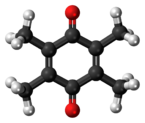Chemistry:Duroquinone
From HandWiki
|
| |||
| Names | |||
|---|---|---|---|
| Preferred IUPAC name
2,3,5,6-Tetramethylcyclohexa-2,5-diene-1,4-dione | |||
| Other names
2,3,5,6-Tetramethyl-1,4-benzoquinone
Tetramethyl-p-benzoquinone | |||
| Identifiers | |||
3D model (JSmol)
|
|||
| 1909128 | |||
| ChEBI | |||
| ChEMBL | |||
| ChemSpider | |||
| DrugBank | |||
| EC Number |
| ||
| 279610 | |||
PubChem CID
|
|||
| UNII | |||
| |||
| |||
| Properties | |||
| C10H12O2 | |||
| Molar mass | 164.20408 g/mol | ||
| Melting point | 109 to 114 °C (228 to 237 °F; 382 to 387 K) | ||
| Hazards | |||
| GHS pictograms | 
| ||
| GHS Signal word | Warning | ||
| H315, H319, H335 | |||
| P261, P264, P271, P280, P302+352, P304+340, P305+351+338, P312, P321, P332+313, P337+313, P362, P403+233, P405, P501 | |||
Except where otherwise noted, data are given for materials in their standard state (at 25 °C [77 °F], 100 kPa). | |||
| Infobox references | |||
Tracking categories (test):
Duroquinone is an organic oxidant (C6(CH3)4O2). It is related to 1,4-benzoquinone by replacement of four H centres with methyl (Me) groups. The C10O2 core of this molecule is planar with two pairs of C=O and C=C bonds.[1]
The compound is produced via nitration of durene (1,2,4,5-tetramethylbenzene) followed reduction to the diamine and then oxidation.[2]
A derived organoiron compound (η2,η2-C6(CH3)4O2)Fe(CO)3 is obtained by the carbonylation of 2-butyne in the presence of iron pentacarbonyl.[3]
The molecule has been mentioned in the popular press as a component of a "nano brain".[4]
Duroquinone was observed in a degradation products generated from pyrolysis of α-Tocopheryl acetate.[5]
References
- ↑ J.-M. Lü, S. V. Rosokha, I. S. Neretin and J. K. Kochi, "Quinones as Electron Acceptors. X-Ray Structures, Spectral (EPR, UV-vis) Characteristics and Electron-Transfer Reactivities of Their Reduced Anion Radicals as Separated vs Contact Ion Pairs" Journal of the American Chemical Society 2006 128, 16708-16719.doi:10.1021/ja066471o
- ↑ Lee Irvin Smith. (1943). "Duronquinone". Organic Syntheses. http://www.orgsyn.org/demo.aspx?prep=CV2P0254.; Collective Volume, 2, pp. 254
- ↑ H. W. Sternberg, R. Markby and I. Wender, "A Quinone Iron Tricarbonyl Complex and its Significance in Organic Synthesis", Journal of the American Chemical Society 1958 volume 80, pp. 1009-1010. doi:10.1021/ja01537a075
- ↑ *Fildes, Jonathan (2008-03-11). "Chemical brain controls nanobots". British Broadcasting Corporation. http://news.bbc.co.uk/1/hi/sci/tech/7288426.stm. Retrieved 2008-03-11.
- ↑ Wu, Dan; O’Shea, Donal F. (2020-03-24). "Potential for release of pulmonary toxic ketene from vaping pyrolysis of vitamin E acetate" (in en). Proceedings of the National Academy of Sciences 117 (12): 6349–6355. doi:10.1073/pnas.1920925117. ISSN 0027-8424. PMID 32156732.
 |



